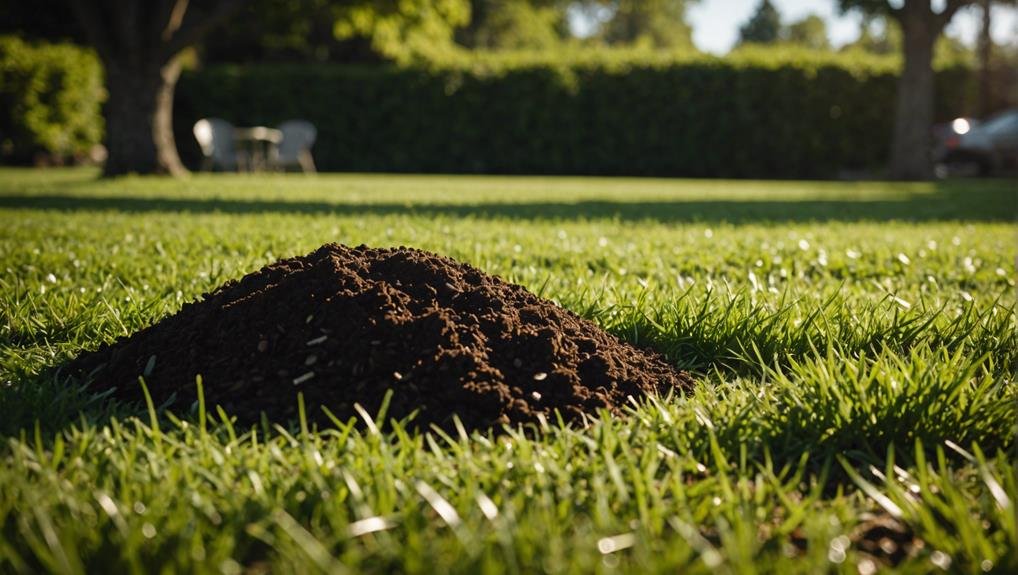Using coffee grounds on your lawn can provide essential nutrients like nitrogen, phosphorus, and magnesium, boosting soil quality and encouraging healthy grass growth. These grounds also attract earthworms, which help with soil aeration and nutrient distribution.
To prevent clumping and potential changes in soil pH due to their acidity, it's advisable to compost the coffee grounds before applying them. This process ensures a balanced release of nutrients.
Moreover, using coffee grounds can help in weed control and pest deterrence, contributing to sustainable waste management practices. Remember, applying the grounds in moderation is key to avoid any negative effects while maximizing their benefits for your lawn's health.
Benefits of Coffee Grounds
Coffee grounds provide essential nutrients like phosphorus, nitrogen, copper, and magnesium for your lawn, promoting healthy grass growth. These nutrients are released slowly, ensuring a consistent supply over time for long-term lawn health.
Additionally, the grounds support earthworm activity, improving soil quality. They also help control weeds, deter insects like slugs and snails, and discourage animals from using the lawn as a litter box.
Drawbacks and Considerations
While coffee grounds can offer a range of benefits for your lawn, it's important to be aware of some drawbacks and considerations to ensure their effective use. Using too many coffee grounds can cause clumping, potentially drying out the grass and hindering its growth.
Moreover, coffee grounds have acidic properties that can change soil pH levels, which may harm plants that thrive in neutral or alkaline conditions. Fresh coffee grounds are especially acidic and should be used sparingly. Therefore, it's crucial to exercise moderation when applying coffee grounds to prevent any negative effects.
Alternatively, composting the coffee grounds before use can help alleviate some of these issues, providing a more balanced release of nutrients and reducing the risk of soil acidification.
Positive Soil Effects

Adding coffee grounds to your lawn care routine can significantly improve soil quality by enhancing aeration and nutrient breakdown, creating a healthier environment for your grass to thrive. These grounds help soil retain moisture and essential minerals like nitrogen, phosphorus, and magnesium, which are vital for grass health.
Moreover, they stimulate beneficial microbial activity, aiding in the decomposition of organic matter and increasing nutrient availability. Earthworms are also attracted to coffee grounds, further boosting soil aeration and nutrient cycling.
Environmental Impact
Aside from improving soil quality, recycling coffee grounds for lawn care offers significant environmental benefits. Repurposing used grounds helps reduce waste and promote sustainability by preventing them from ending up in landfills. This eco-friendly practice supports a circular economy, turning waste into valuable resources for gardening.
Using Different Coffee Types

Different types of coffee, like Arabica and Robusta, have varying nutrient profiles and acidity levels that can impact their effectiveness as lawn supplements.
Arabica beans typically have higher acidity and may more significantly change the soil's pH compared to Robusta. Both varieties contribute essential nutrients such as nitrogen, phosphorus, and magnesium, which are beneficial for grass health.
It's essential to consider the roasting level as well; darker roasts are generally less acidic but may offer fewer nutrients. Moreover, used coffee grounds from brewing methods like drip or espresso are usually less acidic than fresh grounds, making them better suited for direct application on lawns.
Understanding these distinctions helps in choosing the most suitable coffee grounds for enhancing your lawn's health and appearance.
Conclusion
In summary, coffee grounds act as a nourishing tonic for lawns, promoting steady grass growth by slowly releasing vital nutrients like nitrogen and phosphorus.
While improving soil health and providing natural pest control benefits, it is important to use them in moderation to prevent negative effects such as increased soil acidity.
By utilizing this eco-friendly amendment, gardeners can nurture a flourishing, lush lawn while supporting environmental sustainability, ensuring their green space thrives like a well-cared-for garden.












